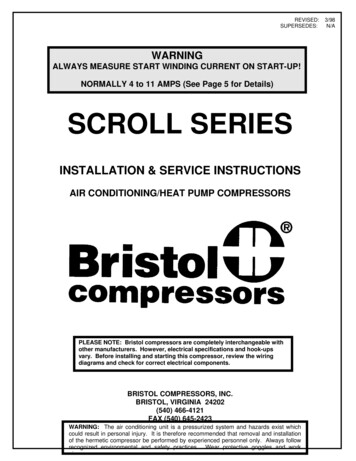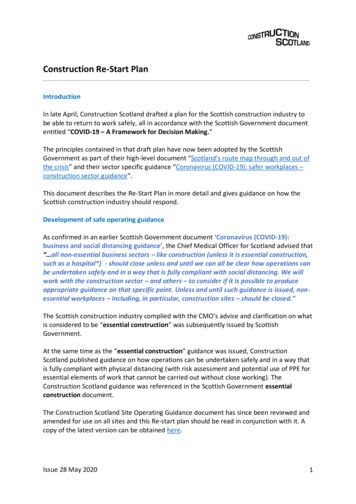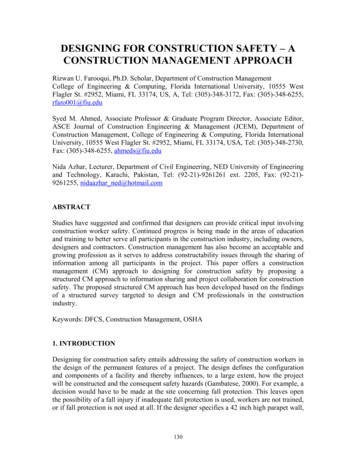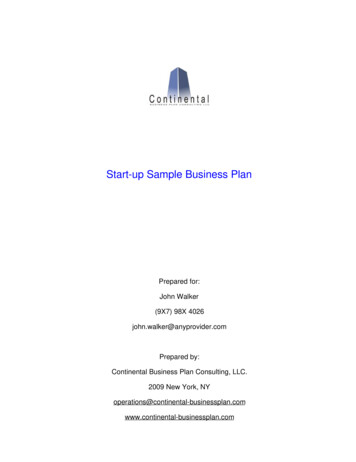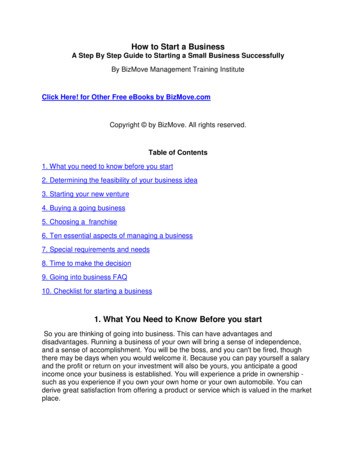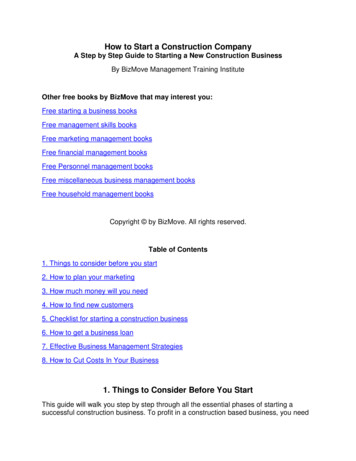
Transcription
How to Start a Construction CompanyA Step by Step Guide to Starting a New Construction BusinessBy BizMove Management Training InstituteOther free books by BizMove that may interest you:Free starting a business booksFree management skills booksFree marketing management booksFree financial management booksFree Personnel management booksFree miscellaneous business management booksFree household management booksCopyright by BizMove. All rights reserved.Table of Contents1. Things to consider before you start2. How to plan your marketing3. How much money will you need4. How to find new customers5. Checklist for starting a construction business6. How to get a business loan7. Effective Business Management Strategies8. How to Cut Costs In Your Business1. Things to Consider Before You StartThis guide will walk you step by step through all the essential phases of starting asuccessful construction business. To profit in a construction based business, you need
to consider the following questions: What business am I in? What do I sell? Where is mymarket? Who will buy? Who is my competition? What is my sales strategy? How muchmoney is needed to operate my firm? How will I get the work done? What managementcontrols are needed? How can they be carried out? When should I revise my plan?Where can I go for help?No one can answer such questions for you. As the owner-manager you have to answerthem and draw up your business plan. The pages of this guide are a combination of textand workspaces so you can write in the information you gather in developing yourbusiness plan - a logical progression from a commonsense starting point to acommonsense ending point.It takes time and energy and patience to draw up a satisfactory business plan. Use thisguide to get your ideas and the supporting facts down on paper. And, above all, makechanges in your plan on these pages as that plan unfolds and you see the need forchanges.Bear in mind that anything you leave out of the picture will create an additional cost, ordrain on your money, when it unexpectedly crops up later on. If you leave out or ignoretoo many items, your business is headed for disaster.Keep in mind, too, that your final goal is to put your plan into action. More will be saidabout this step near the end of this guide.What's In This For Me?The hammer, trowel, pliers, and wrench are well known tools of the constructionindustry. They have their various uses and are needed to get the work done.Management is another tool that the owner-manager of a construction firm must use.Each job must be planned and organized if the firm is to run smoothly and efficiently.The business plan will help you increase your skill as a manager.Because of the diversification in the construction industry, you may be engaged inresidential, commercial, or industrial construction. You may be either a general orspecialty contractor. But, the same basic managerial skills are needed. This plan willserve as a guide to the various areas that you as a manager will be concerned with. Asyou work through this plan, adapt it to your own particular needs.When complete, your business plan will help guide your daily business activities. Whenyou know where you want to go, it is easier to plan what you must do to get there. Also,the business plan can serve as a communications device which will orient keyemployees, suppliers, bankers, and whoever else needs to know about your goals andyour operations.Whether you are just thinking about starting your own firm or have already started, thebusiness plan can help you. As your skill as a manager increases so will the number ofjobs you can effectively control. The careful completion of this plan may point out yourlimitations. This is important. To be a successful contractor you must not only know your
business thoroughly, but must also know your limitations and seek professional advicein these areas.Why Am I In Business?Most contractors are in business to make money and be their own boss. Very importantreasons. But, don't forget, no one is likely to stay in business unless you also satisfy aconsumer need at a competitive price. Profit is the reward for satisfying consumerneeds in a competitive economy.In the first years of business, your profits may seem like a small return for the longhours, hard work, and responsibility of being the boss. But there are other rewardsassociated with having your own business. For example, you may find satisfaction inhelping to put groceries on your employees' tables. Or, maybe your satisfaction willcome from building a business you can pass on to your children.Why are you in business?What Business Am I In?At first glance this may seem like a rather silly question. You may say, "If there is onething I'm sure of, it's what huskiness I'm in." But wait. Let's look further into the question.Suppose you say, "I build houses." Are you a speculative or custom builder? Are you aremodeler? Are you a subcontractor? Can you schedule a complete job and makemoney? By planning according to this decision, you should realize the value of this typeof thinking in dollars.Consider this example. Bob Rogers started a small construction business shortly afterWorld War II. Because of Mr. Rogers' skill and talent for design, he directed all hisactivity toward building taverns. There was enough call for this type of building to keephim and his crew busy until the early 60's. Then sales began to fall off.By moving his shop to smaller quarter with less overhead and by laying off half his crew,he was able to maintain his business to his satisfaction the rest of his life. After hisdeath, his son examined the situation and decided that he wasn't really in the businessof building commercial bars. He was in the business of custom finishing.Today his business is prospering. He is building cabinets and small bars for privatehomes. His company also does other finishing work which requires the craftsmanshiphis crew is capable of.In the space below, state what business you're really in.
What are your reasons for this opinion?Go to Top2. How to Plan Your MarketingWhen you have decided what sort of construction business you're really in, you havemade your first marketing decision. Now, in order to sell your service or product, youmust face other marketing decisions.Your marketing objective is to find enough jobs at the right times to provide a profitablecontinuity for your business. Your job starts must be coordinated to eliminate the downtime between jobs. In other words, you want to get enough jobs, starting at the righttimes, to keep from being broke between jobs.Unless an individual can come up with enough ideas to keep a crew working 12 monthsa year, maybe he or she is not ready for a construction business.Where Is Your Market?Describe your market area in terms of customer profile (age, school needs, income, andso on) and geography. For example, if you are a custom builder, you may decide tobuild homes in the 180,000 to 500,000 price range. This would mean that yourcustomers will have to have incomes in that class ranges. You may also decide that youcan profitable build these homes on the owner's lot if it is located within a radius of 30miles from your office. (The significance of a customer profile is that it will help younarrow your advertising to those media that will reach the potential customer you haveprofiled.) In the space below describe your market in terms of customer profile andgeography.My Product / Types of Customers / Location of CustomersNow that you have described what you want in terms of customer and location, what isit about your operation that will make these people want to buy your service?For instance, quality work, competitive prices, guaranteed completion dates, effectiveadvertising, unique design, and so on.Write your answer here.
AdvertisingYou have determined what it is you're marketing, who is going to buy it, and why they'regoing to buy it. Now you have to decide on the best way to tell your prospectivecustomers about your product.What should your advertising tell prospective customers?What form should your advertising take? Ask the local media (newspapers, radio andtelevision stations, and printers of direct mail pieces) for information about their servicesand the results they offer for your money.How you spend advertising money is your decision, but don't fall into the trap thatsnares many advertisers. As one consultant describes this pitfall: It is amazing the waymany business managers consider themselves experts on advertising copy and mediaselection without any experience in these areas.The following workblock should be useful in determining what advertising is needed tosell your construction service.CompetitionThe competition in the construction industry often results in low profit margins. However,if you are just starting or are a relatively small firm, this does not put you at adisadvantage. The smaller firm can often compete with the bigger outfit because oflower overhead expense. For example, your office may be in your home, saving thatexpense. You can often work right out of your truck, saving the expense of a field office.Competition is largely price competition, although a good reputation for quality andefficiency is beneficial. But, the result of any competition is a high failure rate for poorplanners and poor performers. This points out the need for careful planning, particularlyin the areas of estimating and bidding.
In order to see what you are up against competitionwise, answer the following questionsso you can plan accordingly.Who will be your major competitors?How will you compete against them?Sales StrategyThe market for the construction industry is unique in many ways. As a contractor youwill find your market to be dependent on such variables as the state of the economy,local employment stability, the seasonality of the work, labor relations, goodsubcontractors and interest rates. Also, as a contractor, you will find that you areunavoidably dependent on others, such as customers or financing institutions forpayment, and other contractors for performance of their work. You will also want to takeyour cash flow into consideration when you estimate and bid on a job. The money mustcome in time to meet your own obligations.Estimatingwhether an owner-manager in the construction business succeeds - makes a profit ornot -depends to a great extent on bidding practices. Therefore, you must make carefuland complete estimates.many of the more successful contractors attribute their success to their estimatingprocedures. They build the job on paper before they submit a bid. In doing this, theybreak the job down into work units and pieces of material. Then, they assign a cost toeach item. The total of these costs will be the direct construction cost. you must alsofigure on the indirect costs of a job. For instance, you will have overhead expenses suchas the cost of maintaining your office, trucks, license fees, and so on. The estimateshould also consider any interest charges you will pay on money you borrow to get thejob under way. You have insurance fees to pay, surety bond premiums, travelexpenses, advertising costs, office salaries, lawyer's fees, and so on. These must alsobe paid out of your gross income.Trade associations, as one of their services, often provide their members with apackage of business forms. The cost estimate form would be included in this package.The obvious advantage in using these forms is that they are specifically designed forthe particular trade.
Regardless of what estimate form you use, it should include such headings as "activity,""material," "labor," "subcontracts," and "estimated cost." And it should have areas fordirect construction costs, indirect construction costs, overhead, and profit.In Addition, a column for the actual cost compared to the estimated cost of a specificwork item will make this firm an invaluable record. Here you would have a handyreference to evaluate the profitability of a job after it is complete. It would show youwhere your estimate was high or low, and enable you to adjust future bids on similarprojects. This added column will also be necessary when it comes time for your financialaccounting.BiddingYour decision to bid or not to bid on a particular job should be determined by severalfactors. First, do you have the capacity to complete the job on schedule and accordingto specifications. Beware of overextending yourself out of business. You have tooperate within your known capabilities. On any job, you must follow all the details of thework yourself, or find competent supervision.Planning the WorkWhen your marketing efforts result in jobs to be done, the problem becomes one ofproduction. How will you plan the work so that the job gets done on time?No matter how you plan the work, your plan should assist you in two specific ways: (1) itshould help you maintain your production schedule, and (2) it should allow you to adjustproduction to meet changed conditions. such as bad weather.In planning the work, keep in mind two things: (1) the timing of starts, and (2) the timingof the various steps in the construction of your company. If you have sufficient help andsufficient supervisory personnel, it will be possible for you to engage in as manyprojects as you can control. The size and nature of the job must be considered herealso.The timing of the steps of constructions (the work scheduling) will show the variousoperations in sequence and assign a working day designation to each with a space forthe calendar day designation. Several operations may be in progress simultaneously.Such a work schedule will show at a glance whether the work is progressing at the righttime. Many companies offer commercial scheduling boards designed for this purpose.Below is a partial work schedule to demonstrate how yours may be set up. Note thatthere is a column that can be filled in with either a solid mark or an "
the business plan can serve as a communications device which will orient key employees, suppliers, bankers, and whoever else needs to know about your goals and your File Size: 480KBPage Count: 48
